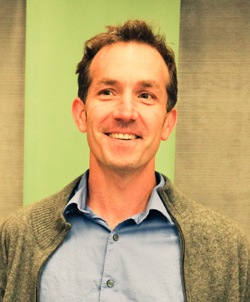Campus News
UCSC partners with Stanford, Salk Institute in stem cell genomics center
The California stem cell agency will fund a $40 million center to bridge the fields of genomics and stem cell research.

The University of California, Santa Cruz, will play a major role in a $40 million Center of Excellence in Stem Cell Genomics approved for funding Wednesday by the governing board of the California Institute for Regenerative Medicine (CIRM). The Center brings together researchers at UCSC, Stanford University, the Salk Institute for Biological Studies, and several other research institutions.
The center will apply the powerful tools of genomics–studying the complete genetic make-up of a cell or organism–to stem cell research. The goal is to gain a deeper understanding of the disease processes in cancer, diabetes, heart disease and mental health, and ultimately to try and find safer and more effective ways of using stem cells in medical research and therapy.
UC Santa Cruz will run the center’s Data Coordination and Management program, building a centralized database for genomic data produced and used by CIRM-funded stem cell researchers throughout the state. UCSC genomics experts Josh Stuart, David Haussler, and Jim Kent will work closely with other investigators on center-initiated research projects. Led by Mike Snyder of Stanford, the center is expected to greatly enhance stem cell research in California and accelerate the development of new therapies.
“This center builds on the amazing progress UCSC has already made in genomics data storage, analysis, and visualization. Aggregating stem cell datasets will allow us to develop and apply new technologies to understanding stem cells and furthering disease models,” said Haussler, a professor of biomolecular engineering in the Baskin School of Engineering and director of the Center for Biomolecular Science and Engineering at UCSC.
The award includes $19 million for the center team to carry out independent and collaborative projects, including investigating disease mechanisms and the development of new technologies for this kind of work. The Data Coordination and Management program, directed by Stuart and co-directed by Haussler, will enable the research to be shared with other investigators around California and the world.
The team at UCSC has a track record of providing world-class data management resources for the biomedical community, from the UCSC Genome Browser developed in 2000 (now averaging 31.3 million hits per month) to the Cancer Genomics Hub (CGHub), which manages genomic data for the National Cancer Institute. The new Stem Cell Hub will provide a solution far more powerful than a simple data storage mechanism. While data archiving will be a major activity, the hub will also create an infrastructure to support both automated and semi-automated analyses of genomic data.
“Stem cell researchers are collecting large amounts of DNA and RNA sequence data, and data analysis is becoming a bottleneck to discovery. We will provide the high-performance infrastructure needed to manage that data,” said Stuart, the Jack Baskin Professor of Biomolecular Engineering in UCSC’s Baskin School of Engineering.
Stuart will also be working with Trey Ideker at UC San Diego to develop new “machine learning” tools specific for making discoveries in the anticipated stem cell datasets. “UCSC graduate students and postdocs will be able to develop cutting-edge methods in collaboration with a multi-institutional team made up of some of the leaders in this field. We’ll be on the front lines of applying new technologies to stem cells and disease models and working on new analytical tools for these data,” Stuart said.
The institutions involved in the center include Stanford, UC Santa Cruz, UC San Diego, the Salk Institute for Biological Studies, the Scripps Research Institute, the J. Craig Venter Institute, and Illumina Inc. UC Santa Cruz will receive about $5.4 million for its part in the center.
“This Center of Excellence in Stem Cell Genomics shows why we are considered one of the global leaders in stem cell research,” said Alan Trounson, president of the stem cell agency. “Bringing together this team, to do this kind of work means we will be better able to understand how stem cells change as they grow and become different kinds of cells. That deeper knowledge, that you can only get through a genomic analysis of the cells, will help us develop better ways of using these cells to come up with new treatments for deadly diseases.”
About CIRM: CIRM was established in November 2004 with the passage of Proposition 71, the California Stem Cell Research and Cures Act. The statewide ballot measure, which provided $3 billion in funding for stem cell research at California universities and research institutions, was overwhelmingly approved by voters, and called for the establishment of an entity to make grants and provide loans for stem cell research, research facilities, and other vital research.